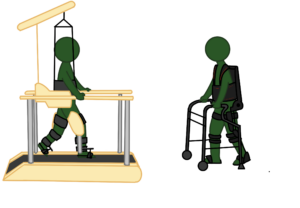Researchers in Dr. Tania Lam’s laboratory are interested in understanding how the pelvic floor muscles respond to walking in different exoskeletons. We are looking for individuals with motor-complete SCI to complete 2 laboratory visits. On the first visit, participants will complete a series of questionnaires, get screened for exoskeleton use, and practice walking in exoskeletons. In the second visit, we will put special recording electrodes on participants to monitor activity from the pelvic floor, trunk, hip, and leg muscles during walking in the Lokomat and Ekso at different speeds.
Why should you participate in this study?

The pelvic floor muscles (PFM) are crucial for bladder function, and training these muscles can improve bladder symptoms for many people. Previous research has shown that people classified as motor-complete SCI can still engage muscles below their level of injury during certain exercises. In this study, we want to explore if and how the PFM and other muscles are active in people with motor-complete SCI during exoskeleton walking. While participants may not experience direct therapeutic benefit from participating, the results from this study will help us better understand how the PFM work and inform bladder management options after SCI.
You may be eligible to participate in this study if you:
- Are at least 19 years of age.
- Have a non-progressive SCI that occurred at least 12 months ago and is at or above the L1 neurological level.
- Have stable management of spinal cord related secondary health concerns (e.g., spasticity, neuropathic pain).
- Have no other neurological injury or diagnosis (e.g., stroke, cerebral palsy)
You will not be eligible to participate in this study if you:
- Are currently pregnant, have been pregnant within the past 6 months, or are currently trying to become pregnant
- Have had urogenital surgery within the past 12 months.
- Are currently experiencing menses (i.e., on your period)
- Are currently experiencing an acute vaginal or urinary infection (e.g., urinary tract injection, yeast infection)
- Have a severe medical issue that in the principal investigators’ judgement would adversely affect the individual’s participation in the study (e.g., untreated pressure sore, musculoskeletal injury that would be worsened by study protocol)
- Are unable to provide consent and/or follow instructions from research staff
- Are unable to speak or understand English
Time commitment
This study involves 2 visits, each of which is 4 hours in duration. However, if you’re unfamiliar with the Lokomat and Ekso exoskeletons, additional visits between the first and last visit may be provided for you to practice walking in these devices. These additional practice sessions would be up to 1 hour in duration, and most people feel comfortable within 5 sessions.
Compensation for participation
Participants will receive an honorarium of $50 to compensate for their time.
This study will take place at:
- ICORD/Blusson Spinal Cord Centre (818 West 10th Avenue, Vancouver)
For more information or to sign up to participate, please contact the study coordinator, Alison Williams, by email at awilliams@icord.org or by phone at (604) 675-8815.

